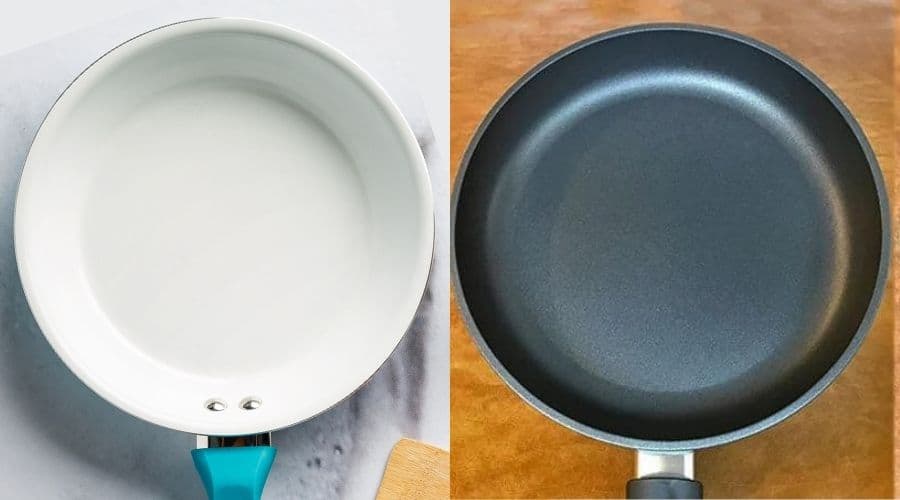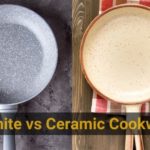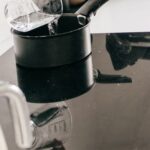Ceramic vs Hard Anodized Cookware: Know the Difference

Ceramic and hard anodized cookware are both popular options for those looking for durable, non-stick surfaces for their cooking needs. Both types of cookware have their own unique benefits and drawbacks, and the best choice for you will depend on your specific cooking habits and needs.
Ceramic cookware is known for its non-stick properties and is often made with a ceramic-coated aluminum or steel base. It is a relatively lightweight and durable option, but it can be prone to chipping and scratching if not handled carefully.
Hard anodized cookware, on the other hand, is made by electrochemically treating aluminum to create a hard, scratch-resistant surface. It is known for its durability and resistance to warping, but it is generally heavier and more expensive than ceramic cookware.
If you’re wondering whether to choose ceramic or hard anodized cookware, this blog post is for you.
We’ll compare the two types of cookware and discuss the pros and cons of each, so you can make an informed decision. Whether you’re looking for durability, ease of cleaning, or heat conductivity, we’ve got you covered.
Ceramic vs Hard Anodized Cookware? Key difference
Ceramic coatings are applied to the cookware surface, while hard anodized is a type of aluminum that has been treated with an electrochemical process to make it harder and more durable.
What is Ceramic Cookware?
When it comes to ceramic cookware, we have two types of cookware, 100% ceramic and ceramic-coated cookware.
100% ceramic cookware is made of clay that has been glazed and fired at high temperatures, while ceramic-coated cookware has a thin layer of ceramic coating over another material, usually aluminum.
Ceramic cookware is also free of harmful chemicals like PFOA and PFOS, making it a safer option than nonstick cookware.
Ceramic coatings can be applied to any type of cookware, but they are most commonly found on frying pans and saucepans.
Pros of Ceramic Cookware
Non-toxic: Ceramic cookware is a popular choice because it doesn’t contain any harmful chemicals. In fact, all the materials used to make ceramic cookware are non-toxic and safe for cooking.
Heats evenly: Ceramic cookware heats evenly, so you don’t have to worry about hot spots.
Non-stick: Ceramic cookware is also non-stick, making it a great option for low-fat cooking.
Durable: With proper care, ceramic cookware can last for years.
What are the drawbacks of ceramic cookware?
It is not suitable for high-heat cooking: You shouldn’t use ceramic cookware for high-heat cooking because it might crack or chip.
What is Hard Anodized Cookware?
Hard anodized cookware is made of aluminum that has been treated with an electrochemical process to make it harder and more durable. The treatment also changes the color of the aluminum from silver to black.
Let’s have a look at some of the pros and cons of Hard Anodized Cookware.
Pros of Hard Anodized Cookware
Non-stick: Hard anodized cookware is non-stick, making it a great option for low-fat cooking.
Durable: Hard anodized cookware is more durable than other types of cookware, so it will last longer.
Heats evenly: Hard anodized cookware heats evenly, so you don’t have to worry about hot spots.
Lightweight & scratch-resistant: Hard anodized cookware is lightweight and scratch-resistant, making it easy to use and care for.
What are the drawbacks of hard anodized cookware?
Hard anodized cookware can’t be used on induction stoves, so you’ll need a different type of cookware if you have one of these stoves.
Ceramic vs Hard Anodized Cookware
Let’s compare hard anodized cookware and ceramic cookware to see which one is the best fit for you.
Cleaning
First of all, ceramic cookware is very easy to clean. The smooth surface doesn’t allow food to stick, so you can usually just wipe it out with a paper towel. If there are any stubborn spots, a little soap and water will usually do the trick.
Hard anodized cookware can also be easily cleaned, but it’s a little more work. The smooth surface is stick-resistant, but scorched food can be a little difficult to remove.
You can use a nylon brush or nylon scrub pad to get rid of the residue, and then soak it in regular dishwashing detergent and hot water.
Durability
When it comes to durability, ceramic cookware tends to wear more quickly than hard-anodized cookware, so it’s prone to chipping and cracking. It can also be scratched easily.
Also, you have to be careful with the type of utensils you use with ceramic cookware. Metal utensils can scratch the surface, which will eventually lead to it breaking.
Hard anodized cookware on the other hand is much more durable and has a stronger coating. It’s made of aluminum that’s been treated with an electrical process, making it more resistant to wear and tear.
As far as using metal utensils is concerned, you can use them with hard anodized cookware without any problems.
Cooking
Ceramic cookware is a good choice for cooking at lower temperatures because it doesn’t conduct heat as well as other materials. This means that it takes longer to heat up, but it also means that food is less likely to stick and burn.
Hard anodized cookware is a better choice for cooking at higher temperatures. It heats up quickly and evenly, so you can get your food to the right temperature without burning it.
Both ceramic and hard anodized cookware is great for cooking. Hard anodized cookware is known for being especially good at evenly distributing heat, while ceramic cookware is known for being non-stick.
Design
Ceramic cookware is often designed with colorful patterns and intricate details. This can make it a pretty addition to your kitchen, but it also means that it’s not as functional as some other types of cookware.
Hard anodized cookware is designed for function over form. It doesn’t have the same flashy designs, but it does have features that make it more useful in the kitchen. For example, many hard-anodized pans have a non-stick surface.
Weight and Maneuverability
Ceramic cookware is generally lighter than other types of cookware. This makes it easy to move around, but it also means that it can be easily damaged if you drop it.
Hard anodized cookware is a little heavier than ceramic cookware, but it’s still easy to maneuver. It’s also less likely to be damaged if you drop it.
Price
Ceramic cookware is usually less expensive than hard-anodized cookware. This makes it a good choice for people who are on a budget.
Hard anodized cookware is more expensive than ceramic cookware, but it’s still a good value. It’s more durable and efficient, so it will last longer and save you money in the long run.
Which is healthier ceramic or hard anodized cookware?
It is generally considered safe to use both ceramic and hard anodized cookware for cooking, as long as they are used and cared for properly. However, there are some factors to consider when determining which type of cookware is the healthier option for you.
Ceramic cookware is generally considered to be healthier than hard anodized cookware because it does not contain any potentially hazardous chemicals or PTFE and PFOA coatings.
On the other hand, hard anodized cookware is made by submerging aluminum cookware in an electrolytic solution, which increases the thickness of its surface layer. This coating makes it more durable and resistant to corrosion and abrasion.
However, hard anodized cookware can have PTFE which has been linked to certain health conditions.
Which one is right for you?
Ceramic cookware is a good choice if you’re looking for something easy to clean and you don’t need the durability of hard-anodized cookware. If you’re looking for a durable, efficient, and good-looking cookware set, then hard anodized is the way to go.
Still, confused about which one to best?
If you are still confused about which one is best then ask a few questions to yourself like what is your budget, what kind of cooking you do most, how often you cook, what are your cooking habits, etc. This will help you to get a better idea and then decide which one suits you best.
At What Temperature Do You Cook?
First thing first, what is your cooking temperature? If you usually cook at lower temperatures, then ceramic cookware would be a good choice. If you find yourself cooking at higher temperatures more often, then hard anodized cookware is the better option.
How Often Do You Cook?
If you’re someone who cooks frequently, then you might want to invest in hard anodized cookware. It’s much more durable than ceramic cookware and it can last a lot longer. If you only cook every once in a while, then ceramic cookware would be a better choice since it’s less expensive.
What Kind of Cooking Do You Prefer?
If you enjoy cooking a wide variety of dishes, then you’ll need a versatile cookware set. Hard anodized cookware is versatile and can be used for a variety of cooking methods.
If you’re someone who prefers to stick to one or two types of cooking, then ceramic cookware would be better suited for you. It’s great for baking and roasting, but it’s not as versatile as hard anodized cookware.
What is Your Budget?
As mentioned before, ceramic cookware is less expensive than hard-anodized cookware. This might be a deciding factor if you’re on a tight budget.
What Utensils do You Use When Cooking?
If you’re someone who likes to use a lot of utensils when cooking, then hard anodized cookware is a better choice. It has a non-stick surface, so it won’t be damaged by metal utensils.
If you don’t use many utensils when cooking, then ceramic cookware would be a good choice.
Method Used to Clean Your Cookware
Ceramic cookware is dishwasher safe, but hard-anodized cookware is not. If you’re someone who likes to put their cookware in the dishwasher, then ceramic cookware would be a better choice.
If you hand wash your cookware, then it really doesn’t matter which type you choose. Both ceramic and hard-anodized cookware can be easily cleaned with a little soap and water.
Are You Looking for Durability?
If you’re looking for a durable cookware set that will last a long time, then hard anodized cookware is the better option. It’s much more resistant to scratches and chips than ceramic cookware.
Final Verdict
In the end, the best cookware for you depends on your individual needs and preferences.
If you’re looking for something durable that can handle a lot of wear and tear, then hard anodized cookware is the way to go.
If you’re looking for something that’s easy to clean and less expensive, then ceramic cookware would be a better choice.




